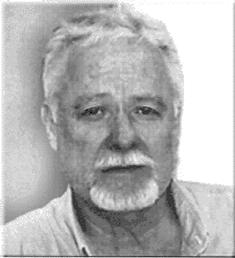I'm Willing to be Convinced I'm Wrong
I run ads in college newspapers encouraging students and professors alike to take seriously the great ideal of Western culture, intellectual freedom—even with regard to the Holocaust controversy. Because I argue for an open debate on the Holocaust you are told that I’m anti-Semitic; yet I invite Jews everywhere to join with me, in a context of good will, to discuss the growing controversy over the orthodox Holocaust story.
You are told that because I encourage open debate on the Holocaust that I’m a racist, yet my family is Mexican.
You are told I’m a liar, though my promise is to correct any error of fact discovered in my ads.

Bradley R. Smith
You are told that my ads mislead students. I urge students (and professors as well) to read the text of my ads carefully and to refuse to be misled by me—or anyone else.
You are told it’s wrong to be a “denier.” I answer that when we debate historical issues it is wrong to be a “denier” or a “true believer” either one.
You are told I say that the Holocaust is a “hoax.” What I say is that some of it happened, some of it didn’t, and that the time is come to separate the wheat from the chaff.
You are told that my motives for questioning the gas chamber stories are bad. I find myself unable to judge the motives of those who judge mine. I can only do what they do—-speculate.
You are told it is ludicrous that I involve myself in an historical controversy when I have no academic degrees. I answer that the ideal of a free press is not a matter of credentialism.
You are told I “hate” because I try to convince professors that they should encourage intellectual freedom rather than suppress it, even with regard to the Holocaust story. I answer that it is precisely those questions that are taboo that should be asked first.
Forty years ago I was arrested, tried, and convicted for selling a book then banned by the US Government—Henry Miller’s Tropic of Cancer. In 1961 I argued that college students have the right to read radical literary works. Today I argue that college students have the right to read whatever radical historical papers they choose to read, on the Holocaust or any other matter.
You are told I am wrong to doubt that Germans killed millions of Jews and others in homicidal gassing chambers. I answer that I am willing to be convinced that I’m wrong. I ask (for example) that one professor inform me of one exhibit at the US Holocaust Memorial Museum that proves Germans used gas chambers to kill Jews.
You are told college newspapers have no obligation under the First Amendment to print my advertisements. I encourage student editors to ignore this “legalism.” The First Amendment is a mere by-product of that great tradition of intellectual freedom in Western culture. When Plato was writing about Socrates there was no First Amendment, yet this great ideal was already centuries old.
You’re told that the Holocaust is about Jews. I answer that it’s about Jews and Germans together—forever. I ask if Germans are not human like the rest of us? I ask if false accusations about Germans should not be exposed, just as we expose false accusations about Jews?
You’re told it is good that students believe what is taught in college about the Holocaust and wrong to doubt any of it. I answer that with regard to historical controversy, belief is out of place while skepticism is good.
You’re told the evidence proving the orthodox Holocaust story is “overwhelming.” I ask, if that’s so, what is there to fear from open debate?
You’re told that the great crime of the National Socialist German Worker’s Party (Nazis) is that they intentionally killed civilians. I agree—though I no longer believe they used gassing chambers as a weapon. Moreover, during World War II Republicans and Democrats created a State policy for the intentional mass killing of civilians. Their weapons were the great fleets of bombers used to pulverize all the great cities of Germany and Japan and kill their civilian inhabitants. Hundreds of thousands of German and Japanese civilians were burned alive, culminating in the nuclear destruction of the civilian populations of Nagasaki and Hiroshima.
You are told it was wrong for Nazis to intentionally kill civilians because their motives were bad. You are told it was right for Democrats and Republicans to intentionally kill civilians because their motives were good. I say to you that it is shameful to hold Germans to a higher moral standard than we hold ourselves.
You are told there is not, there can not be, another side to the Holocaust story and that it is “hate” to say there is. I answer that I am reminded of those in Nazi Germany who said there was not, there could not be, another side to the “Jewish question.”
There is always another side to every historical controversy. Those who have something to lose from a free exchange of ideas will always condemn free speech. Those in authority will always fear intellectual freedom. A free press is always under attack.
I’m willing to be convinced I’m wrong about any of this. Try me.
Bibliographic information about this document: The Revisionist # 7, Sept. 2001, Codoh series
Other contributors to this document: n/a
Editor’s comments: n/a
